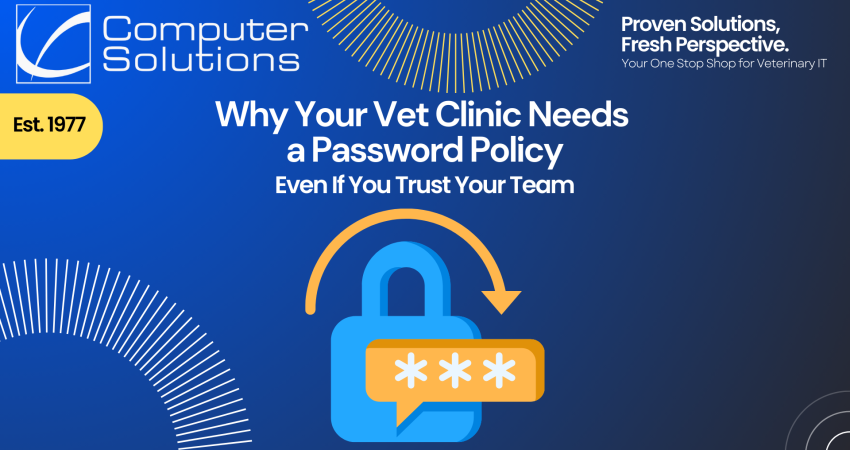
Posted by Computer Solutions on September 29, 2025
In a veterinary clinic, trust is everything between teammates, with pet owners, and across vendors. But when it comes to technology, trust alone isn’t enough.
Even if you have a close-knit, high-performing team, your clinic still needs a formal password policy. Why? Because good intentions don’t prevent data breaches, strong veterinary password security does.
Let’s look at why password policies matter, what they should include, and how they protect your clinic without adding friction to your day.
Trust Isn’t a Security Strategy
Most veterinary teams are full of caring, capable professionals, not hackers. But security incidents don’t usually happen because someone was malicious. They happen because someone reused a password, clicked a bad link, or shared credentials out of convenience.
Here’s the reality:
- Staff reuse the same password for their email, PIMS, and online CE courses
- Passwords get stored in browsers or written on sticky notes
- Former employees still have access to clinic systems weeks after leaving
- Shared logins make it impossible to trace who accessed what
These are all common and avoidable weak points. A written password policy turns those blind spots into structured protection.
What a Password Policy Actually Covers
A strong veterinary password security policy isn’t just about making everyone memorize 16-character gibberish. It’s about setting clear, clinic-wide rules for how access is created, managed, and revoked.
At a minimum, your policy should include:
1. Password Creation Rules
- Minimum of 12 characters
- Must include numbers, upper/lowercase, and a symbol
- No pet names, clinic names, or common phrases
2. Storage Guidelines
- Passwords must be stored in an approved password manager (not browsers)
- No handwritten notes or unlocked spreadsheets
- Never shared via text or email
3. Rotation & Expiration
- Passwords are updated every 90 days
- System-generated alerts remind users before expiration
4. Access Control
- New accounts created only by a designated admin
- Remove or disable accounts on the employee’s last day
- Admin access limited to specific roles
5. Multifactor Authentication (MFA)
- Required for email, PIMS, and any cloud platform
- Enforced on all remote access tools and backups
These basics may sound simple, but they’re foundational to veterinary password security that holds up under real-world pressure.
What Happens Without a Policy?
Without clear standards in place, things slip through the cracks. That creates risk—not just for your data, but for your operations and client trust.
Here’s what can (and does) happen in clinics without a policy:
- A staff member leaves, but their email and imaging login stays active for months
- A manager stores passwords in a shared document “just in case”
- Two team members use the same login to a payment platform and a transaction error can’t be traced
- Someone clicks a phishing link, enters a reused password, and gives a hacker access to your scheduling system
Real-World Example: One Password, Big Problem
A veterinary clinic in Pennsylvania (not our client, but a cautionary tale) had a single shared email login used by the front desk team for appointment reminders, client follow-ups, and prescription refill requests.
One day, a former employee who still had access, logged in from home, accidentally clicked a phishing link, and entered the shared credentials into a fake login page.
Within 24 hours, the clinic’s email account was sending spam to hundreds of clients, and some began receiving fake invoices. The breach didn’t expose patient data, but it led to serious reputational damage and over 20 hours of remediation work.
Had the clinic used unique logins and disabled the former employee’s access, the breach likely wouldn’t have happened.
Implementing a Policy Doesn’t Have to Be a Hassle
You don’t need to roll this out overnight or lecture your team with tech jargon. In fact, the most effective password policies are:
- Simple enough for everyone to follow
- Enforced automatically through systems (not memory)
- Supported by training and reminders not blame
Start by reviewing your current tools. Do you have MFA turned on? Are staff using a password manager? Who still has access to what? From there, you can build a short, written policy that works for your team, not against it.
At Computer Solutions, we often pair this with staff security training, access audits, and cloud account cleanup, all part of our standard support for veterinary clients.
Let’s Build Password Policies That Work
You already have strong people. Now it’s time to back them with strong processes.
We help veterinary practices across the United States create password policies that improve veterinary password security without slowing anyone down. Whether you’re starting from scratch or updating outdated rules, we’ll help you implement the right tools and training for your clinic.
Ready to make your passwords part of your protection, not your problem?
Call 609.514.0100 or schedule a free password policy review here with our team today.
Want to learn more about veterinary IT and cybersecurity? Check out last week’s blog post here!
Discover more from Computer Solutions
Subscribe to get the latest posts sent to your email.







